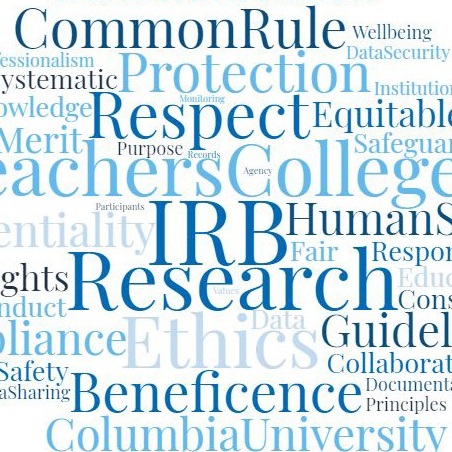The modern IRB emerged in response to concerns about questionable ethical practices employed in many biomedical and behavioral research studies during the twentieth century. The current federal regulations specified in the Belmont Report and the Common Rule inform and guide the actions of the IRB at colleges, universities, medical schools, and other research institutions. These regulations apply to all studies that meet the criteria for human subjects research. In the Belmont Report, three ethical principles guide the work of the IRB:
- Respect for persons
- Beneficence
- Justice
A researcher applying the principle of respect for persons recognizes that people are autonomous and capable of independent decisions, including whether to participate in a research study. The researcher will ensure that individuals are provided with clear and understandable information about the research activities and the opportunity to consent to participate in the study. Individuals incapable of such self-determination deserve additional considerations and protections.
Researchers applying the second principle, beneficence, pledge to “do no harm,” seek to protect their subjects from suffering, and “maximize [the] possible benefits and minimize [the] possible harms” of their projects. Protecting human subjects may include confirming a participant’s wishes to continue or entirely stopping the study.
The final principle in the Belmont Report is justice, which is designed to address equal distribution of both benefits and burdens of research. This principle underlies the additional regulatory protections for vulnerable populations including children, prisoners, and the cognitively impaired. A researcher should assess research-related risks by identifying all potential harms that could befall a subject, the magnitude, and probability of those harms. The researcher should ensure appropriate steps to minimize identified risks. Then, the researcher should determine the potential benefits to subjects (if any) and to science and society.
Teachers College (TC) IRB administrators face challenges in their day-to-day work, such as setting expectations for human research protection policies, to clearly communicating those policies to researchers with diverse skill sets.
Myra Luna Lucero, Research Compliance Manager, Ed.D. Communication and Education
We understand that completing IRB paperwork is a time-consuming and involved process. To ease this process, we offer TC researchers Mentor IRB, an integrated web portal protocol management system found at MyTC/Mentor IRB. Mentor IRB’s electronic system can track researcher submitted documents, offer direct messaging options, and retrieve approved site documents in a few clicks.
TC IRB also provides resources and templates for helping researchers navigate the IRB submission process. If a researcher’s question cannot be answered through visiting the sources provided on Mentor IRB or our website (specifically the How to Submit and FAQs pages), they can then contact the IRB office directly.
We at the Teachers College IRB strive to elevate the quality of research by ensuring the safety of every human research participant.
We at the Teachers College IRB strive to elevate the quality of research by ensuring the safety of every human research participant. We are focused on developing campus and community-wide relationships based on ethics, service, safety, and innovation. We aim to uphold the highest levels of research protection and we are committed to compassionate engagement with research participants.
